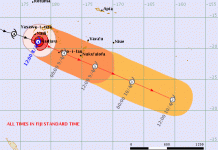The New Zealand Media Council has partly upheld a complaint against Radio New Zealand about a story it published, Tonga’s PM accused of insincerity at Pacific Forum.
Tony Wilson complaint against RNZ about late Prime Minister ‘Akilisi Pohiva after he delivered a speech during discussions on the impact of climate change at the Pacific Forum in Tuvalu in August.
Wilson said the journalist who wrote the original story, Tongan correspondent Kalafi Moala, had been consistently opposed to the Prime Minister.
The Council said while criticism of Mr Pohiva and government was eventually balanced by a statement from him and an explanation from a government spokesman, the Council was concerned about the time that elapsed before a response was published by RNZ.
“There was no balance to the criticism. Mr Pohiva was not given an opportunity to respond. A person reading the article would form a very adverse view about Mr Pohiva,” the Council said.
This was a piece of journalism that was strongly critical of Mr Pohiva, it said.
The Council upheld the complaint under Principle 1 which states: Exceptions may apply for long-running issues where every side of an issue or argument cannot reasonably be repeated on every occasion and in reportage of proceedings where balance is to be judged on a number of stories, rather than a single report.
This was a current story. In this case, while criticism of the PM and government was eventually balanced by a statement from the PM and an explanation from a government spokesman, the Council was concerned about the time that elapsed before a response was published.
Although politicians can expect to encounter robust criticism, the Media Council felt that fairness required the PM to be more promptly offered a right of reply to what were serious allegations. RNZ gave no reason for the delay, but if the PM or his spokesperson did not wish to comment or could not be reached for comment that could have been recorded in the story. The Council considered that the six-day delay was too long to wait before publishing a response to serious criticism and it upheld the complaint under Principle 1.
The Council, however, did not uphold the complaint under Principle 6 which requires headlines and captions to accurately reflected the content of the story.
The story on RNZ’s website on 22 August 2019 was headed Tonga’s PM accused of insincerity at Pacific Forum and said that while Tonga’s Prime Minister ’Akilisi Pohiva [who has subsequently died] was praised for shedding tears of empathy over the impact of climate change at the Pacific Forum, he had been accused of insincerity and hypocrisy, as homes and schools in Tonga had not been repaired a year after being damaged by Cyclone Gita.
The story reported that social media posts had accused the Prime Minister of putting on a “Hollywood act” while doing nothing for local people. An unidentified teacher said her school was still operating in tents, and the heat and lack of ventilation caused higher than usual rates of illness. A local newspaper editor was quoted as saying the Prime Minister was hypocritical, saying: “It is all an act in front of regional leaders. Here at home he is very hard hearted toward the poor and suffering, and is arrogant, and does nothing to ease the difficulties suffered by people.”
Two further stories were published and comments from these and links were added to the original story. In the second story on 28 August, the Prime Minister denied the allegations, and his spokesperson said the delays in school repairs were the responsibility of agencies such as the World Bank. In the third story, on 3 September, the government corrected the previous statement, saying the government was in charge of school repairs, apologised for the delay and said repairs would start by the end of the month.







